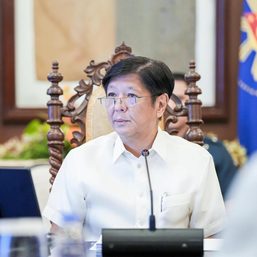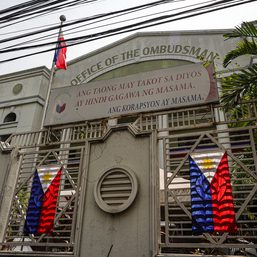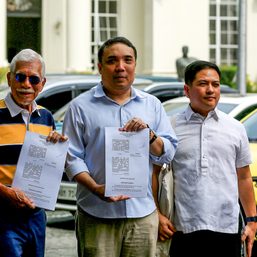SUMMARY
This is AI generated summarization, which may have errors. For context, always refer to the full article.

MANILA, Philippines – As Congress finalized the proposed P5.268 trillion national budget for 2023, a commissioned survey showed that an overwhelming 92% of Filipinos thought the government needed to strengthen anti-corruption laws.
The Pulse Asia survey, conducted September 17 to 21, also showed that 36% of Filipinos believed limiting corruption would aid in the economic recovery and development of the country.
The results of the survey, which was commissioned by think tank Stratbase Albert del Rosario Institute, highlighted how the persistent problem of corruption continued to weigh heavily even on ordinary citizens.
In this context, Stratbase president Victor Andres Manhit emphasized the importance of good governance.
“Accountability – I also like its stronger, more evocative Filipino term, ‘pananagutan’ – is something that we lack in our governance culture,” Manhit said during the Stratbase Pilipinas Conference on Monday, November 21. “Imagine if all our officials made their decisions in a transparent way, and always in the interest of the people.”
The think tank president also wanted the upcoming budget to serve the basic needs of the people. (READ: 2023 budget to prepare PH for post-pandemic, disasters, global economy)
“At the end of the day, ordinary citizens are actually the main drivers of development, but they need to be given the opportunity. We need to turn these citizens into productive members of society,” Manhit said in a separate statement.
The first national budget proposed by the administration of President Ferdinand Marcos Jr. has been subjected to close scrutiny due to the unusually large confidential and intelligence funds in the budget of agencies whose functions have nothing to do with peace and order and security. CIFs are lump sums that do not go through the usual auditing rigor.
Digital transformation to be DBM’s priority
Department of Budget and Management (DBM) secretary Amenah Pangandaman also advocated for greater transparency and accountability in the budget process and the government as a whole. She planned to achieve this through bolstering the government’s digitalization efforts.
“By investing in digitalization, we connect Filipinos to more opportunities. That is why in our proposed 2023 budget, P12.47 billion will be provided for ICT and digitalization programs and projects of the government,” she said, speaking at the Stratbase Pilipinas Conference.
The DBM, along with other government agencies, also intend to fast-track the Budget and Treasury Management System, which would provide real-time data to the public. DBM undersecretary Maria Francesca M. Del Rosario explained that citizens would be able to monitor how much of the budget was utilized and how long various projects would take to be completed.
“Digitalization ensures transparency and accountability, and that’s really precisely why we are encouraging a lot of digitalization projects now,” Del Rosario said. “It’s one of our northstar in doing our projects in the DBM.”
Oversight on confidential funds
On Monday, the Senate constituted a body that would oversee the more than P9.28 billion in confidential and intelligence funds distributed across agencies in the 2023 budget, following a tradition since the 10th Congress.
Senate President Migz Zubiri filed Senate Resolution No. 302, which creates a select oversight committee on intelligence and confidential funds, with a request to the public “to be more trusting of our government agencies,” which need those nearly-audit-free funds to confront “strange new challenges in these strange new times.”
“Crime looks and moves differently than we are used to. Sometimes it creeps into vulnerable spaces, like schools – where illegal drugs or child pornography can find root in. So, in these times, we need to be more trusting of our government agencies. We have to have faith that they would use every inch of diligence and discretion in undertaking surveillance and intelligence gathering in the discharge of their mandates,” Zubiri said.
At the same time, he vowed that the Senate oversight committee would “subject these confidential and intelligence funds to checks and balances” since “these are not subject to the usual or regular auditing rules and procedures of the Commission on Audit (COA).”
“We will exercise the full extent of our oversight function: We will monitor the use of these funds; we will go over the reports relevant to each agencies’ use of funds; and we will conduct hearings if necessary,” he said.
Meanwhile, Budget Secretary Pangandaman said in a chance interview that the use of CIFs is “very defined.”
“In 2015, COA and DBM released a joint circular on how to use it,” she explained. “While it is considered to be a lump sum fund, before any disbursement or release of such fund, I think the agencies submit to COA kung saan nila gagamitin yung funds.”
Pangandaman said she would defer to actions that the Congress would take on the funds in question. – Rappler.com
Add a comment
How does this make you feel?
![[In This Economy] Why Marcos is getting high on unprogrammed funds](https://www.rappler.com/tachyon/2024/07/TL-marcos-program-funds-july-19-2024.jpg?resize=257%2C257&crop=265px%2C0px%2C720px%2C720px)
![[In This Economy] Is the Marcos government unlawfully dipping into PhilHealth funds?](https://www.rappler.com/tachyon/2024/07/marcos-government-philhealth-funds-july-12-2024.jpg?resize=257%2C257&crop=425px%2C0px%2C1080px%2C1080px)



![[WATCH] Bamban POGO scandal: There’s a bigger fish than Alice Guo](https://www.rappler.com/tachyon/2024/07/inside-track-tcard-bamban-pogo.jpg?resize=257%2C257&crop=435px%2C0px%2C1080px%2C1080px)



![[OPINION] What kind of citizens are we?](https://www.rappler.com/tachyon/2024/07/tl-what-kind-of-citizen-are-we.jpg?resize=257%2C257&crop=333px%2C0px%2C1080px%2C1080px)







There are no comments yet. Add your comment to start the conversation.